This content was published: May 21, 2012. Phone numbers, email addresses, and other information may have changed.
PCC a beacon in hybrid, electric car repair research
Photos and story by James Hill
A service repair on an internal combustible engine vehicle can cost hundreds of dollars. The replacement of a battery for a hybrid or electric car will cost thousands.
Portland Community College’s Automotive Service Technology Program at its Sylvania Campus (12000 S.W. 49th Ave.) is developing curriculum out of hybrid and electric car battery research to create a template for industry techs on how to service them more affordably.
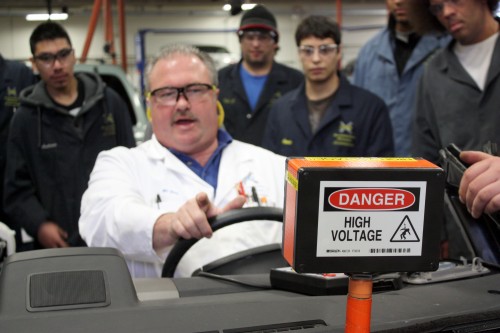
Automotive Service Technology instructor Russ Jones shows first term students the dangers of working on high voltage hybrid batteries.
According to PCC Auto Service instructors, they see the need because the industry is reporting more battery wear-and-tear stemming from the original hybrids that are more than a decade old. When trouble strikes, technicians typically just replace the battery pack, which costs the consumer roughly $2,000, rather than trouble-shooting the cause.
“The reality is that these vehicles are starting to get to the point where they are having component failure in the battery packs, the inverters and electric machines,” said Russ Jones, PCC Automotive Service Technology instructor and the lead on the program’s hybrid training. “The industry has not been very good at training technicians on how to deal with these cars safely as well as make diagnostic repairs. We’ve recognized the need to provide training for working technicians.”
Battery research like ‘exercising’
Through the program’s own research, PCC technicians have reconditioned batteries for two Honda Civic Hybrids, improving engine performance and fuel economy. Kim Kittinger, Automotive Service Technology instructor, said she and her students break the battery packs down, taking out individual modules and test how strong they are. They do that by seeing how long the power supply goes for by dropping the power down to their dead cells and then bringing them back up and maxing them out with energy. They repeat the process over and over.
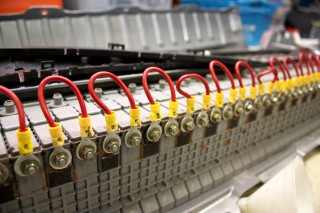
A Toyota Prius battery pack contains many small batteries that each must be worked on during the re-conditioning process.
“It’s like when we exercise and push ourselves, we get stronger,” Kittinger said. “Not all of them, but many of the batteries we can bring back to life. It’s really cool. Then we put them into the packs and back into the cars. We end up buying more time and more life for these packs. It’s vehicle maintenance really; the new form of it.
“Our research is letting us figure out how to test these by seeing what we can and can’t rebuild and what we can or can’t replace in it,” she added. “Hopefully, we’ll have a good answer on how long we can expect these to work after we rebuild them.”
Findings lead to new curriculum
The aim is to massage this research into its curriculum to share with students, local technicians, fellow community colleges and businesses across the Pacific Northwest and beyond. The program, which is developing a 30-credit hybrid-training certificate, has partnered with two local repair shops, Hawthorne Auto Clinic in Southeast Portland and Todd’s Import Automotive in Lake Grove, to look at how they can provide better and more affordable repair work for hybrid and electric cars.
“It gives us more validity of what we are doing by seeing how this works on a real-world customer’s car,” Jones said of using the repair shops in their research.
In particular, Hawthorne technicians are using PCC tools and equipment as well as the research in the auto shop’s lab to make repairs on their customer’s vehicles to test out the developments. In return, the shop and its customers give feedback to PCC on how well the cars are responding to the work. Jim Houser, co-owner of Hawthorne, said his company has had a longstanding relationship with PCC.
“We had also decided to focus on hybrid repair, but there’s a limited amount of information available to independent repair shops and even dealerships have just one or two people fully up to date on them,” said Houser, whose shop has been repairing hybrids since 2002. “Mistakes can be costly. If you do something you shouldn’t it will cost the shop owner a lot of money. For us it’s been a really good partnership with PCC and has given us the skills and confidence to go deeper than we would normally and do the repairs knowledgeably and safely.”
Federal funding helps train future green workforce
The college has invested approximately $350,000 in hybrid and electric equipment such as the purchase of 10 hybrid cars plus tools; built a hybrid mock-up for students to learn on (2006 Toyota Prius); offered continuing education training to fleet and industry techs; and integrated findings into the curriculum.
In September of 2010, PCC received a federal grant of $200,000 from the Small Business Administration (co-administered by the Department of Education). The college was one of several partners on the grant, but the only auto-related partner involved. The mission of the grant is to establish green jobs or advance the green skill set of workers in industry and make them more marketable.
Josh Miller, 30, of Southeast Portland and a native of Indiana, is in his first term in the Automotive Service Technology Program, pursuing a childhood dream of working on cars. He said the automotive repair field is changing and new technicians need those green skills.
“I don’t think you can work in this field and not know how to work on a hybrid vehicle at some point in your career,” Miller said. “Hybrid work is very new and unfamiliar, but I’m interested in getting further into it. I think these skills are very marketable. This is definitely needed. It seems like this is where everything is going.”
Houser said students with hybrid repair skills will be in demand.
“With new fuel economy standards coming, the most effective way for car manufacturers to meet them is to build some version of a hybrid,” Houser said. “Everybody has a hybrid. People have a big investment in those cars and they want to keep them longer.”


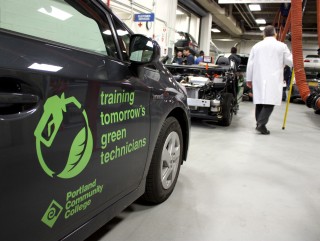
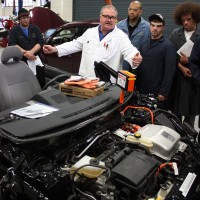
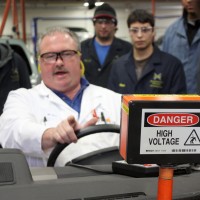
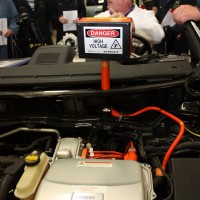
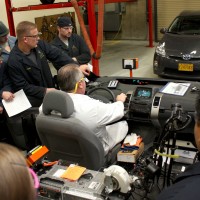
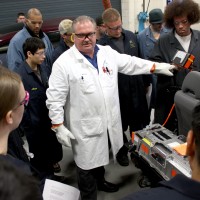
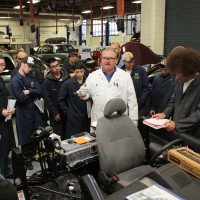
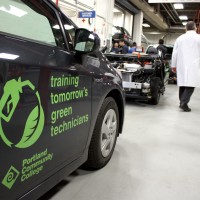
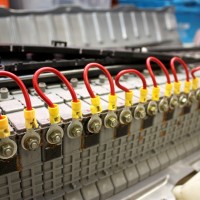
This is a really great thing to see happening at pcc. I always hear people talking about the downsides to the current hybrids. It’s important for people to hear what is working/being improved on so they want to back/continue to back green technology.
The movement of transportation and human basic needs technologies toward sustainable applications has become a global concern and opens opportunities such as this that are exciting. I’m in the Facilities Maintenance Technologies program here at PCC and hope to continue into alternative energy production incessant education.
I’m glad to see PCC making advancements in technology and education.
There are many untapped methods and technologies that should be explored toward optimizing electric and hybrid machinery.
I want to take this course of study too after reading about this…
Many people worry that if the maintenance of hybrid car to be very costly and difficult than non-hybrid vehicles. However, this is relative, depending on the owner of the vehicle and how to care. In some cases, regular routine maintenance of non-hybrid can be more expensive and more complicated than hybrid vehicles.
{link removed}
Having worked in the automotive service field as a dealership line technician, I can say that my experience with hybrid vehicles is that with some makes/models, maintenance is actually very limited in necessity. While a normal internal combustion engine requires routine maintenance of a multitude of components/systems, the hybrid vehicle has fewer items on its manufacture’s recommended maintenance schedule.
When there are failures in battery components, the practice has been to replace the battery, which is costly and presents difficulties on disposal/recycling and the slowly building infrastructure. This new approach may prove to be an interesting alternative and presents a much needed avenue to help create demand for technicians. As these generally lower maintenance vehicles are becoming more popular, less demand for the technician has been a fear amongst those of us in the field.
Congratulations Russ and Kim on the outstanding work your program is providing for the students. PCC is fortunate to have you both as faculty!
Moe O’Connor
I’m glad this is going on at PCC. Hybrid and electric cars are the future and we need technicians and engineers who know how this technology works. Technicians should definitely test individual battery modules and attempt to revive the decayed ones before making an order for an entire new battery pack, and if some modules can’t be brought back to life, just order a few new modules and plug them into the pack.
With perusing the internet I’ve seen Toyota Priuses with well over 200,000 miles with the original NiMH battery pack and going strong.
Batteries will get nano-wire technology in the coming years that will drastically increase energy densities (more electric range!).
I hope that by 2020 there will be at least a few EV parking spots on each PCC campus. Might be hard to get students with regular cars to not park there though.
If anyone reading this wants to drive a fuel efficient hybrid but has concerns about battery longevity, then have no fear. Hyundai now offers a lifetime warranty on their Sonata hybrid. The only caveat is that you have to be the original owner of the car. So 300,000 miles down the road and the battery wears out, they’ll recycle the old one and give you a new battery for free.
Thanks Dan for the info. As long as Hyundai stays in business, that would be a great deal, especially if its battery has a good range to it for commuting. This is definitely the future.
James, so true, I have had so many things outlive the company I purchased them from, and the company that manufactured them. Always be cautious of the “lifetime warranty” just ask those that bought Ginsu knives in the 70’s just before Ginsu went bankrupt, yes they are back now but you get my point. I also had a shall remain nameless ion electronic air cleaner, I loved it, it broke, I went to get it fixed (lifetime warranty only good at the store you purchased it from, they closed all their stores and went online only. I was SOL at that point, had to create E-waste and throw it away because I couldn’t fix it, nor get it fixed.
The only problem I have with hybrids and EV’s is why should I spend 30,000 bucks to save a few hundred in gas per year, plus have to pay full coverage insurance? I drive a 1982 Buick getting 12MPG if I am lucky, but I only drive maybe 4000 miles a year. I do not see myself running out to go into debt just to drive an EV. But I would love to learn how to fix them then charge people for swapping out dead cells in their cars. Sounds good to me.
Kewlio
How ironic that PCC is crowing about investing in “green” technology but the sad reality is that there is no possibility for me to charge my electric vehicle on the Sylvania campus. While I think this sort of curriculum is great, it would be even greater if PCC “practiced what it preaches”.
I believe there is talk about adding electric vehicle chargers to pcc. I think as electric vehicles become more main stream you will see the charging stations pop around PCC.
@Mike, buy a used 1st generation Honda Insight. 50+ MPG and not that expensive to buy.
[…] of its hybrid/plug-in charge technology program. It’s used those funds to become one of the only academic programs in the nation that is developing curriculum out of hybrid and electric car battery research to create a template […]
[…] technology program. It’s used those funds to become one of the only academic programs in the nation that is developing curriculum out of hybrid and electric car battery research to create a template for industry techs on how to service them more […]
Hey! This post could not be written any better!
Reading this post reminds me of my previous room mate!
He always kept talking about this. I will forward this article to him.
Fairly certain he will have a good read. Thanks for sharing!
Granted, we don’t get many hybrids in asking for a battery change but how about this: Is there a reason why we don’t spend more time looking at battery repair vs battery replacement?
Great work! That is the kind of information that are meant to be shared
around the web.